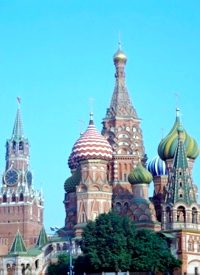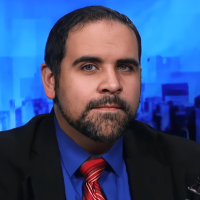
The RCWP-RPC, formed in 2001 by the amalgamation of the Russian Communist Workers’ Party and the Russian Party of Communists, serves as a partial rival to the Communist Party of the Russian Federation (CPRF), which it views as too moderate.
It should be noted that Tyulkin, although leader of the RCWP-RPC, was elected to Russia’s parliament on the CPRF ballot, and is the most hard-line Communist in the Duma.
The RCWP-RPC claims that it “unites people whose world-view is built on the unshakable foundation of Marxism-Leninism” and is dedicated to the “revival of Soviet power to Russia from collapse and colonization.” Soviet power, to them, is defined as “the most stable form of the dictatorship of the proletariat … the highest form of democracy.”
In the Question & Answer section of the group’s website, when it asks “Can I restore the Soviet Union?” the party’s response, unsurprisingly, is “Yes you can,” further pointing out that “Restoration can begin… from Russia, if the Soviets would be its republics, regions, territories. Just above must be restored Soviet power. This is important. Everything else is a matter of time and specific conditions.”
Just as “the Communists of other countries,” the website continues, the RCWP-RPC “has the same ultimate goal,” which is: “to put an end to all forms of oppression and exploitation of one part of society and another built on the site new exploitative society.”
The party also states that it is “fighting resolutely and uncompromisingly against any manifestations of nationalism, chauvinism, racism and the most heinous, inhuman, reactionary ideology of big business — Nazism and Zionism.”
Speaking on behalf of the RCWP-RPC, and Russian Communists as a whole, Tyulkin declared: “Our party believes that the main conclusion has already been made, and it lies in the fact that we deal with the same crisis of capitalism, which is described by the classics, and who explained the nature of capitalism. Capitalism is always pregnant with crises…”
In what sounded like a criticism of bailout and stimulus solutions, Tyulkin railed:
The crisis should be analyzed, to expose the true nature of its origin, but above all — to promote the socialist revolution to the masses (the need of the revolutionary way out of the inevitable under capitalism, economic crises and disasters, which they turn into crises for workers), rather than to the development of certain anti-crisis program[s] for the bourgeois government.
Tyulkin essentially asserts that his Communist party and others will not and should not sit idle and go along with the mainstream government initiatives to “fix” the economy, but instead should take advantage of this opportunity to bring about “the socialist revolution.”
The visible manifestation of “the socialist revolution” may have been averted in Russia last week with the preemptive arrest of Russian [retired] GRU Colonel Vladimir Kvachkov of the Popular Front for the Liberation of Russia, who was accused by the FSB of plotting an armed coup against the government.
Although Col. Kvachkov’s Popular Front for the Liberation of Russia and the RCWP-RPC are both dedicated to a struggle of “national liberation” to “save” Russia, it is unknown if both organizations are related to each other. But whether related or not, Tyulkin’s call for socialist revolution appears to have support in Russia.
The bulk of Tyulkin’s speech was essentially praise for the “success” of the Communist Party of Greece (CPG), which saw a 3 percent increase in seats in the Greek parliament.
In addition to praising the CPG, he also criticized the CCP — the Chinese Communist Party — for “being a business partner of U.S. imperialism” and “taking part in enhancing the exploitation of workers.”
Tyulkin went on to state that “unlike the Soviet Union and the Communist Party, the CCP has almost no support for the world communist and revolutionary movement.”
Although this idea is also shared by radical Maoist groups today which view the current CCP as “impure” or a sellout of the ideals of Mao, it should be noted that most Communists — including the CPRF and the Communist Party of Ukraine — do not hold such hostile views against the CCP.
High-ranking KGB defector Anatoly Golitsyn, in his book New Lies for Old, exposed the Sino-Soviet split, during the Cold War, as nothing more than a Soviet strategy designed to deceive the West.
Today any traces of a Sino-Soviet or Sino-Russo “split” are completely nonexistent, as both counties are leading members of the Shanghai Cooperation Organization and hold annual joint military drills.
Proving how much of a radical hardliner he is, Tyulkin even took swipes at the CPRF, under the leadership of Gennady Zyuganov, attacking its true commitment to Communism by declaring the following points against it:
•Declaration of the exhaustion of the limit on the revolution;
•Rejection of the dictatorship of the proletariat and the organization of the class struggle;
•Attempt to pass a parliamentary democracy;
•Commitment to the model of market socialism;
•Support of the Orthodox Church and its allegedly positive role in the development of spirituality, society, and so on.
Tyulkin designated his party — the RCWP-RPC — as the true Communist party established against the “reformist” policies of Gorbachev, which currently possesses a record of taking part in “all the major strikes of modern Russia,” naming the following examples:
•At the Vyborg Pulp and Paper Mill, where [for] the first time in modern history … Russia fired workers (1998);
•In the fight [of] dockers [at] St. Petersburg sea port;
•A strike against the trade union of air traffic controllers;
•In all industrial action workers at Ford Motors
Taking advantage of his international audience, Tyulkin seized the opportunity to announce the formation of the Russian Joint Labor Front, which its charter describes as “a voluntary association, established on a voluntary basis by citizens of the Russian Federation, united by common political beliefs for the implementation of policy and statutory objectives of ROT FRONT.”
The objective of the Russian Joint Labor Front is to serve as a united left-wing political front for Communists to reclaim control of the Russian government in future elections; however the initiative has yet to win the full support of the CPRF, which remains the second largest party in the Duma, second only to Putin’s “centrist” United Russia Party.
The importance of Tyulkin’s speech is that it reveals how radically far to the left Russia’s Communists still are in Russia, going as far as labeling the CPRF “reformist” and accusing the CCP or collaborating with “U.S. imperialists.” The fact Tyulkin and the RCWP-RPC are allowed to participate in Russia’s political process, when other dissidents, such as Vladimir Bukovsky, are frozen out, is a good indication that they are part of the Kremlin’s controlled opposition. Tyulkin serves a number of important functions, the primary one being to make the current regime of Putin and Medvedev appear moderate and reformist, even as Putin’s FSB/KGB minions return Russia day-by-day and ever more openly to the Stalinist Soviet model. The attacks by Communist Tyulkin on Putin serves to reinforce the false image that Russia’s leaders have made a true “break with the past” and are no longer Communists pursuing Communist objectives.
Regardless of the internal differences that may be displayed by the CPRF and RCWP-RPC, even if one claims to be more Communist than the other, they are still Communists nevertheless and are thus more likely to work together for the same overall goals than helping their enemies, as is evident by Tyulkin’s participation as an official member of the CPRF in the Duma while still being the leader of the RCWP-RPC.
Tyulkin serves as a stern reminder that Communism remains alive and well in Russia today — marching openly under the Communist banner, as well as under the various “reform” labels.




